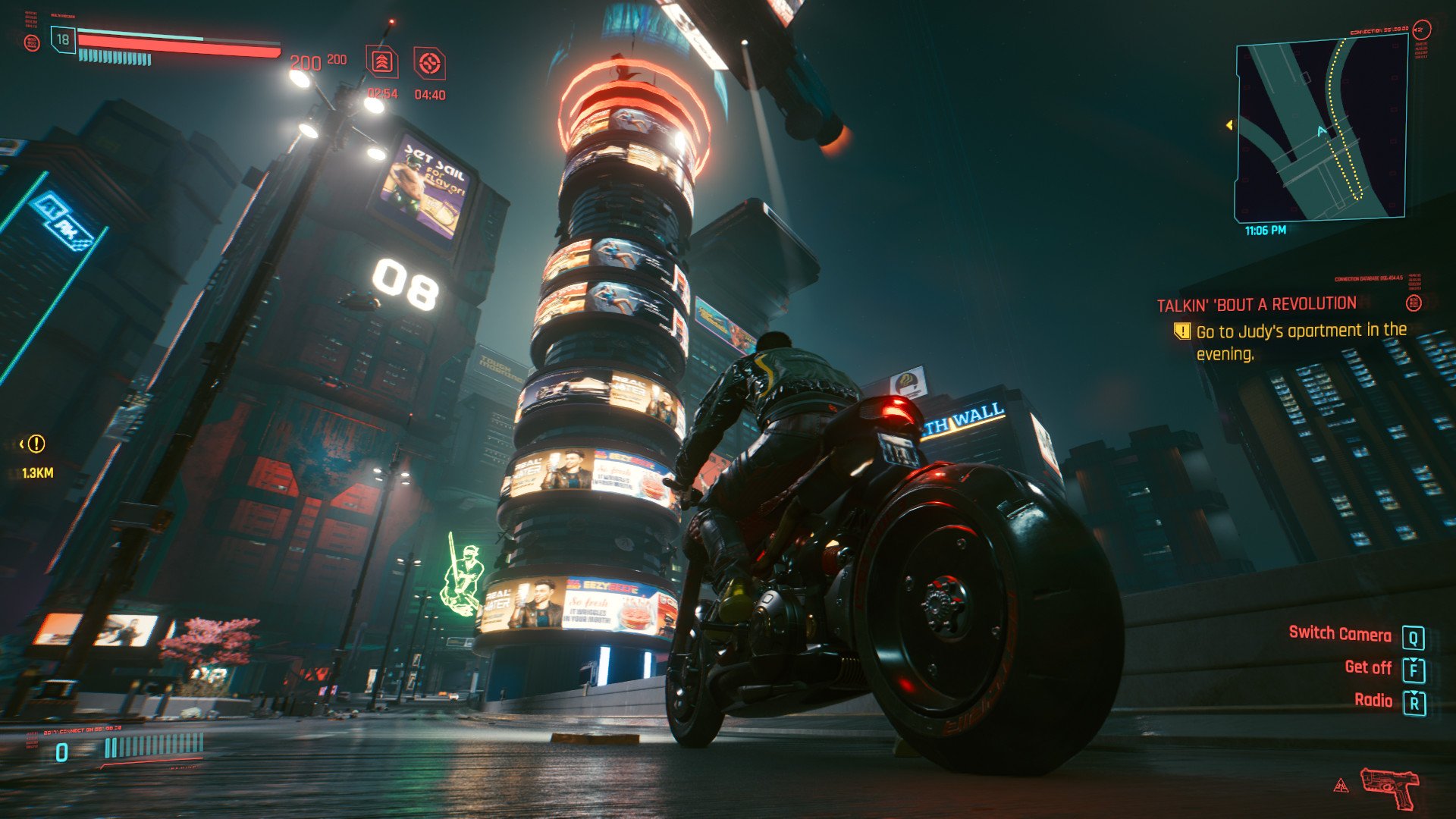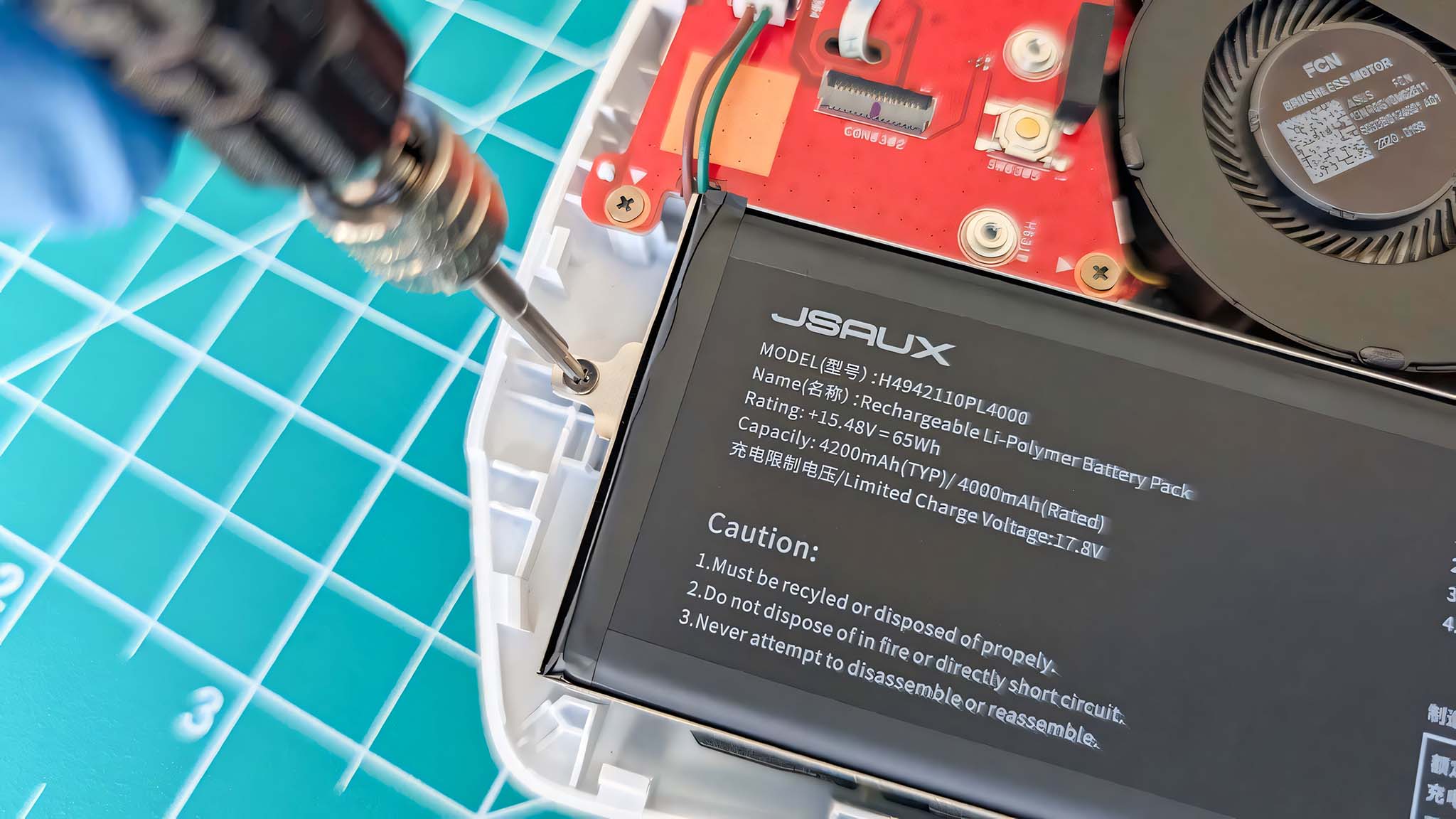As I write this, I've just completed Cyberpunk 2077, announced all the way back in 2012. After eight years and some notoriously high-profile delays, it feels almost surreal that we're finally here. I am among the lucky few tasked with presenting Cyberpunk 2077 as a player, and despite having written literally thousands of articles, this particular task feels uniquely daunting.
Cyberpunk 2077 won't be bested for years — it is a masterpiece.
I feel as though I could write thousands upon thousands of words about my time in Night City. The sheer scale of Cyberpunk 2077 as a creative project is simply without precedent. The more I played, the more I began to realize I was experiencing a landmark moment in creative media. Cyberpunk 2077 represents cutting edge technology. It represents the uncompromised vision of Mike Pondsmith's Cyberpunk universe, translated meticulously into video game form. It represents the execution of what is surely among the most gargantuan digitized acting projects in history.
Cyberpunk 2077 represents a true leap forward for the medium, with an experience that I'm sure will come with equal parts controversy and admiration. One thing is for certain: nobody will be able to ignore this game. It will be picked apart, scrutinized, and analyzed for years to come. Cyberpunk 2077 is going to hit this industry like an earthquake.
After a week or so with the game and dozens of hours played, my honest-to-goodness recommendation is that you don't read this review. Go in blind. Enjoy this moment, and savor its rarity. Simply stated, as an experience, Cyberpunk 2077 won't be bested for years — it is a masterpiece, wholly without equal.

$60Bottom line: Cyberpunk 2077 is an open-world masterpiece that features some of the most immersive and liberating storytelling this industry has to offer. With full freedom to choose V's personality, looks, and gameplay style, Cyberpunk 2077 gives the player an unrelenting amount of control in a world that delivers dozens upon dozens of hours of high-quality content. Cyberpunk 2077 is a mammoth achievement and solidifies CD Projekt RED's place at the top of the pile.
For
- Absolutely jaw-dropping visuals
- Great performance and stability
- A truly insane level of immersive sim gameplay freedom
- Every scene choreographed, with narrative choice at the center
- Top-shelf voice acting and character performances
- A gargantuan open world full of unique interior locations, free of loading screens
Against
- Immense amount of small bugs leech the immersion
Jaw-dropping
Cyberpunk 2077 review: Visuals and sound
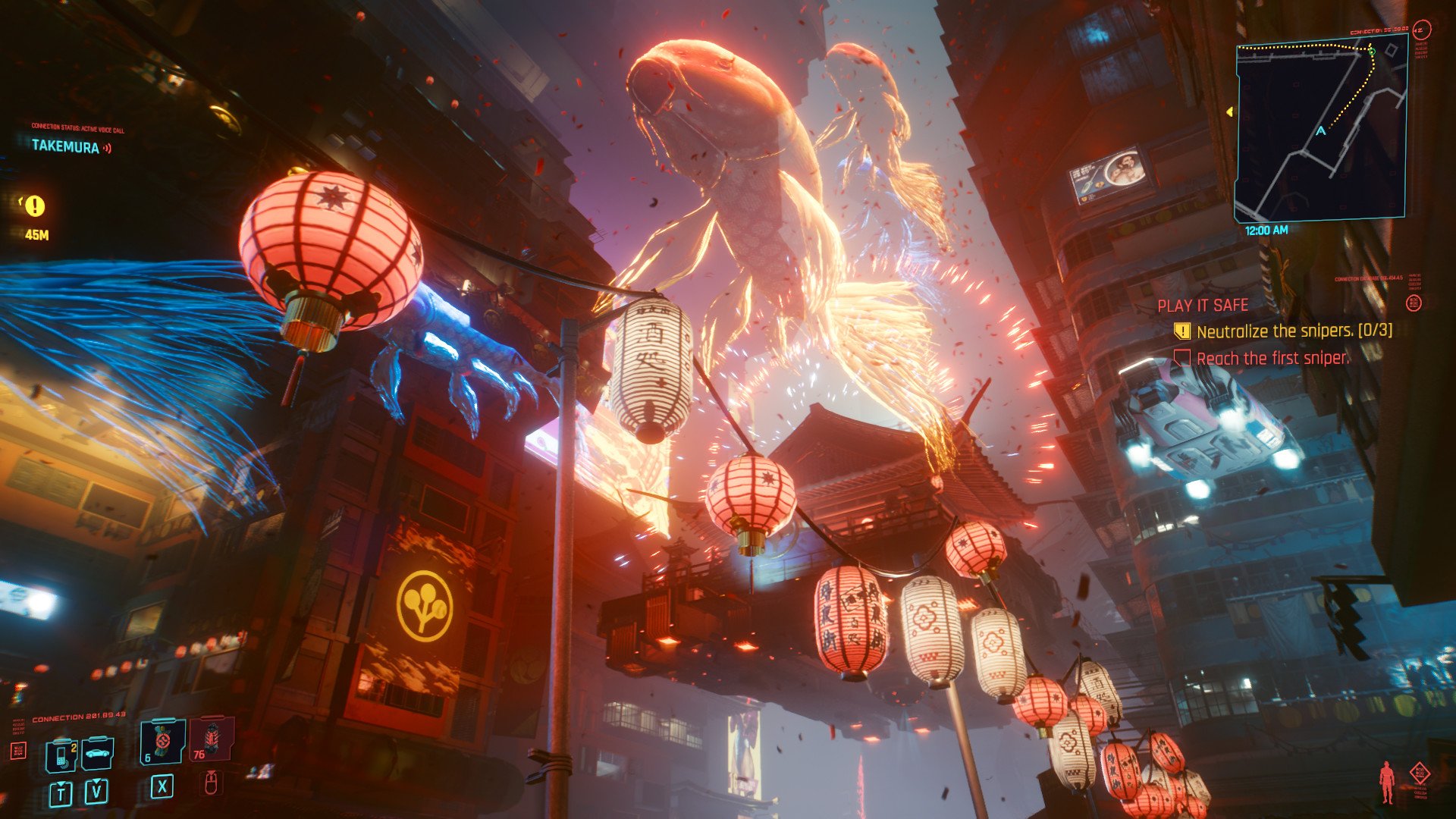
Cyberpunk 2077 is an absolutely jaw-dropping game visually, built on a proprietary engine CD Projekt RED made in partnership with NVIDIA and other tech heavyweights. The effort shows in the details of each area and how well the engine handles the transitions between open-world areas and more densely packed interior locations. There are no loading screens save for fast-traveling across the map, and even when moving to an interior area, you can always look out of the window and see the open world, brimming with NPC crowds and moving vehicles. This is the most immersive open-world I have ever experienced. Cyberpunk 2077 is now the standard-bearer for marrying artistic license with cutting-edge technology.
| Category | Cyberpunk 2077 |
|---|---|
| Title | Cyberpunk 2077 |
| Developer | CD Projekt RED |
| Publisher | CD Projekt RED |
| Genre | Immersive sim, RPG, first-person shooter |
| Recommended Requirements | 64-bit Windows 10, DX12, Intel Core i7 (4790) / AMD Ryzen 3 (3200G), 12GB RAM, NVIDIA GTX 1060 (6 GB) / AMD Radeon R9 Fury / SSD |
| Game Size | 70GB |
| Play Time | 30 to 50+ hours |
| Players | Single-player, with multiplayer coming later |
| Launch Price | $60 |
| Launch Date | 10 Dec, 2020 |
I ran Cyberpunk 2077 on my Razer Blade 17 Pro, using an RTX 2070 GPU at 1080p. Cyberpunk 2077 held 60 frames per second easily throughout, perhaps dropping a little when certain weather effects like storms kicked in, but for the most part, it was rock solid. I kept ray tracing turned off to ensure higher performance where possible, but for those with rigs powerful enough for it, Cyberpunk 2077 is a true marvel. You will want the best graphics card you can afford. I may be able to tweak settings even higher in the future. NVIDIA is releasing new drivers soon, specifically for Cyberpunk 2077, and CD Projekt RED is working on further optimization updates that are set to arrive before the game launches on December 10, 2020.
From a design perspective, Night City is an open-world playground without equal. CD Projekt RED captured the high-speed and diverse lifestyles of the Western metropolis, alive with bustling market places, seedy red-light districts, downtown skyscrapers, and underbridge slums. You'll traverse to the gang-infested outskirts and beyond into the deserted badlands, where madmaxian outlaws rule the roads from their customized apocalypse rigs. The game's reflections and shadows truly sing at night, particularly so in the rain. Frequently, Night City invites you to take your pedal off the gas and simply spend a few moments gazing in awe at the neon-washed beauty.
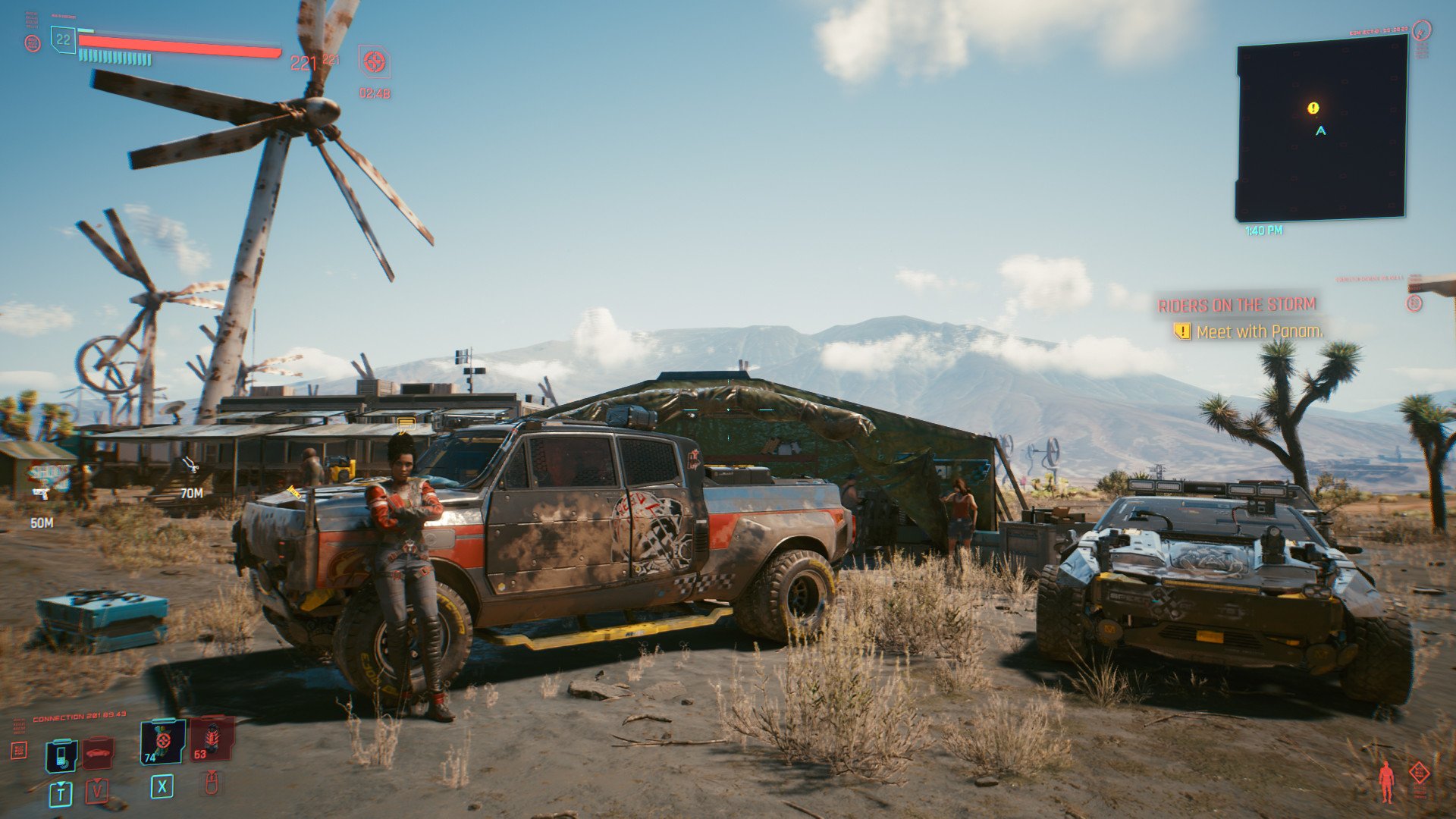
Night City is remarkable for its verticality, as much as its density. Many missions will take you inside buildings, and despite playing for dozens of hours, I have yet to see the vaguest hint of copy and paste. Megabuildings feel like small cities within cities, reaching up into the sky, plastered with tawdry neon commercials that extend into the clouds like an endless holographic ad reel. The sheer volume of meticulous detailing is almost humbling. Whether it's a stunning vista scorched by the dawning sun or the minutiae in the dashboard interior of one of the game's dozens of vehicle models — the scope of Cyberpunk 2077's detailing is almost daunting.
CD Projekt RED's art direction for Cyberpunk 2077 is an example to be followed.
Junk food outlets filled with insect burgers and protein paste dot the landscape, as real meat becomes an unaffordable luxury. Vending machines spit out cheap guns to anyone for just a handful of Eurodollars, as the lack of law enforcement forces citizens to take their safety into their own hands. Every corner of this simulation is designed to enhance the game world's believability, and it's all the more immersive for it.
As you progress, the story will wind you through each of Night City's districts, in turn, giving you a tour of a dystopia that feels like it could become unsettlingly close to reality. Each district has a distinct visual design based on the inhabitants' culture and the gangs that dwell there. Cyberpunk 2077 is also treated to an incredible and diverse soundtrack, penned by CD Projekt RED heavyweight Marcin Przybyłowicz.
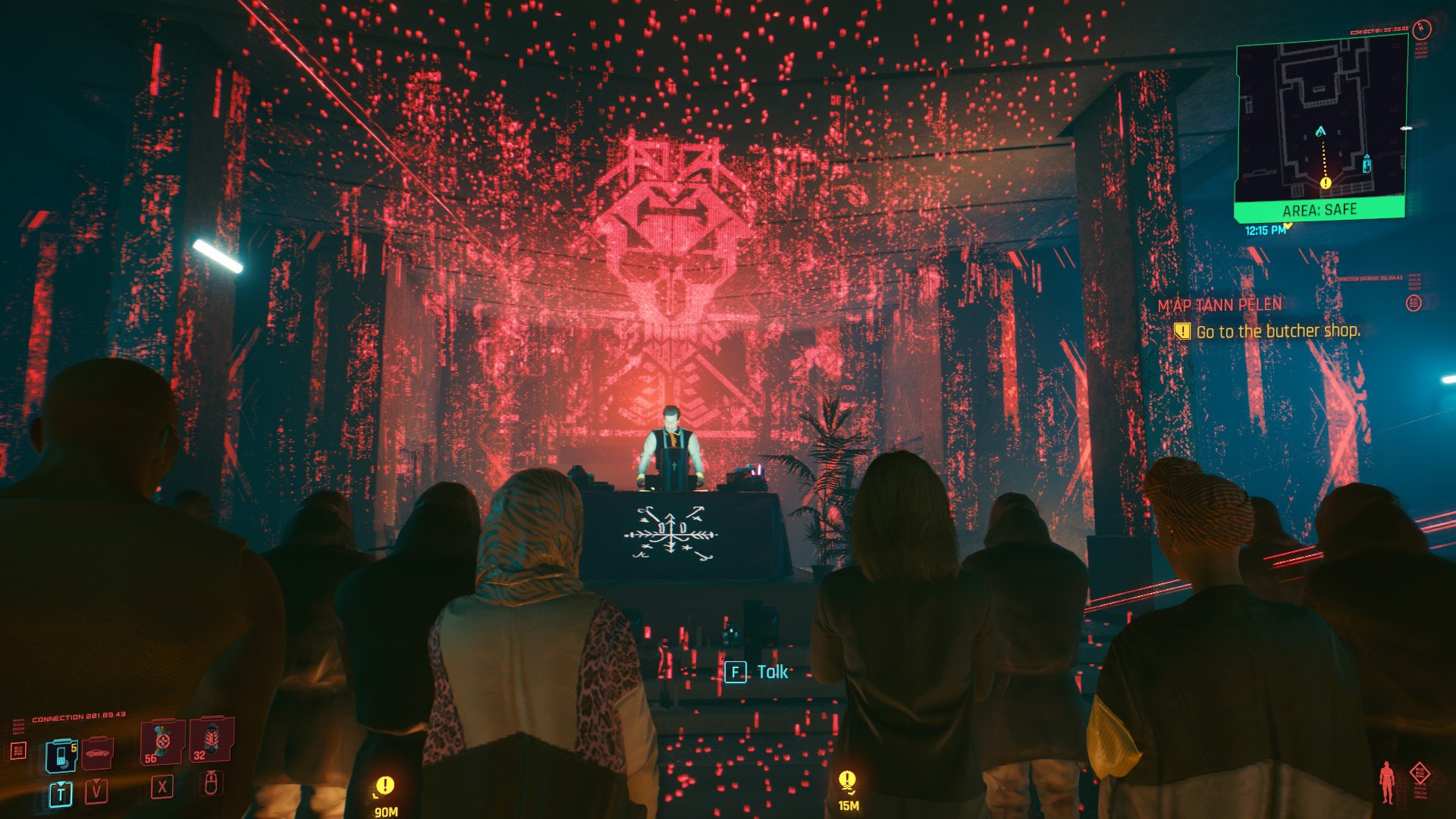
Often times, I would simply step out of stealth to listen to the futuristic electro beats that explode when you enter combat. Cyberpunk 2077's music shifts effortlessly between futurism and nostalgia, with various genres represented, strewn through anxious visions of Night City's hyper-tech dystopia.
From every pixel to every note, CD Projekt RED's art direction for Cyberpunk 2077 is an example to be followed.
So many details
Cyberpunk 2077 review: Story delivery (no spoilers)
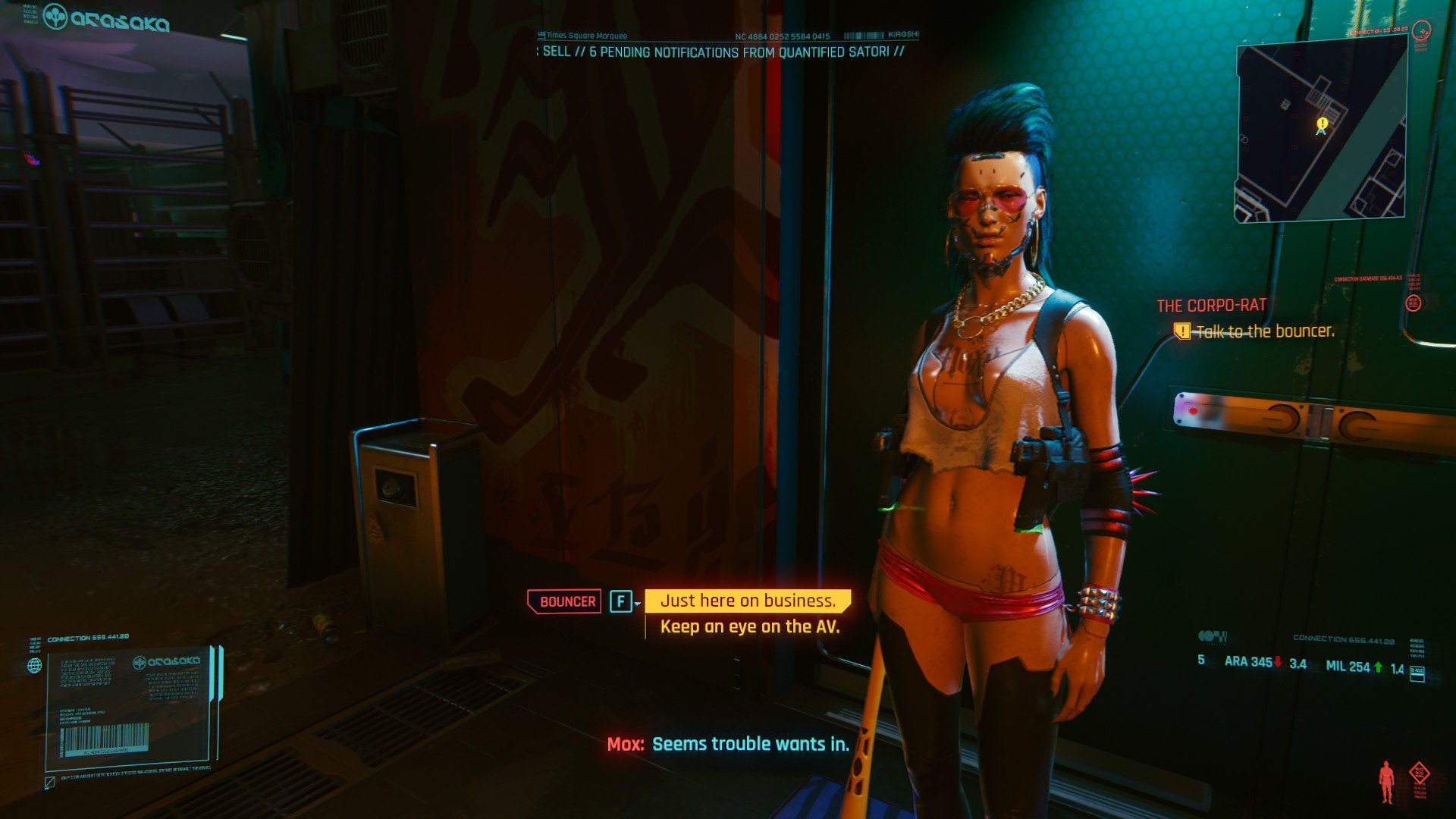
Set in California in 2077, Night City is one of the last memories of Western opulence. Megacorps now rule the world openly, taking the law into themselves, as ordinary folks are stamped out in the crossfire. With the Night City Police Department utterly overwhelmed, they allow mercenaries to operate freely among the populace, as citizens and corporations take justice into their own hands.
Cyberpunk 2077 uses Mike Pondsmith's Cyberpunk tabletop roleplaying universe as its base, giving it a rich, established backstory to draw upon. The game doesn't wait before throwing you in at the deep end, referring to past historical events in detail, complete with unique Night City slang. If you're not familiar with the Cyberpunk lore, it can be disorienting at first, but a few hours in, you'll feel right at home.
In this universe, the United States has fallen. In its wake is a loose union of states that somewhat reminisces of the old U.S., but it seems to be anything but in reality. Night City is part of the Free State of North California, making it a unique location for corporations and organized criminal elements to avoid certain legal restrictions.
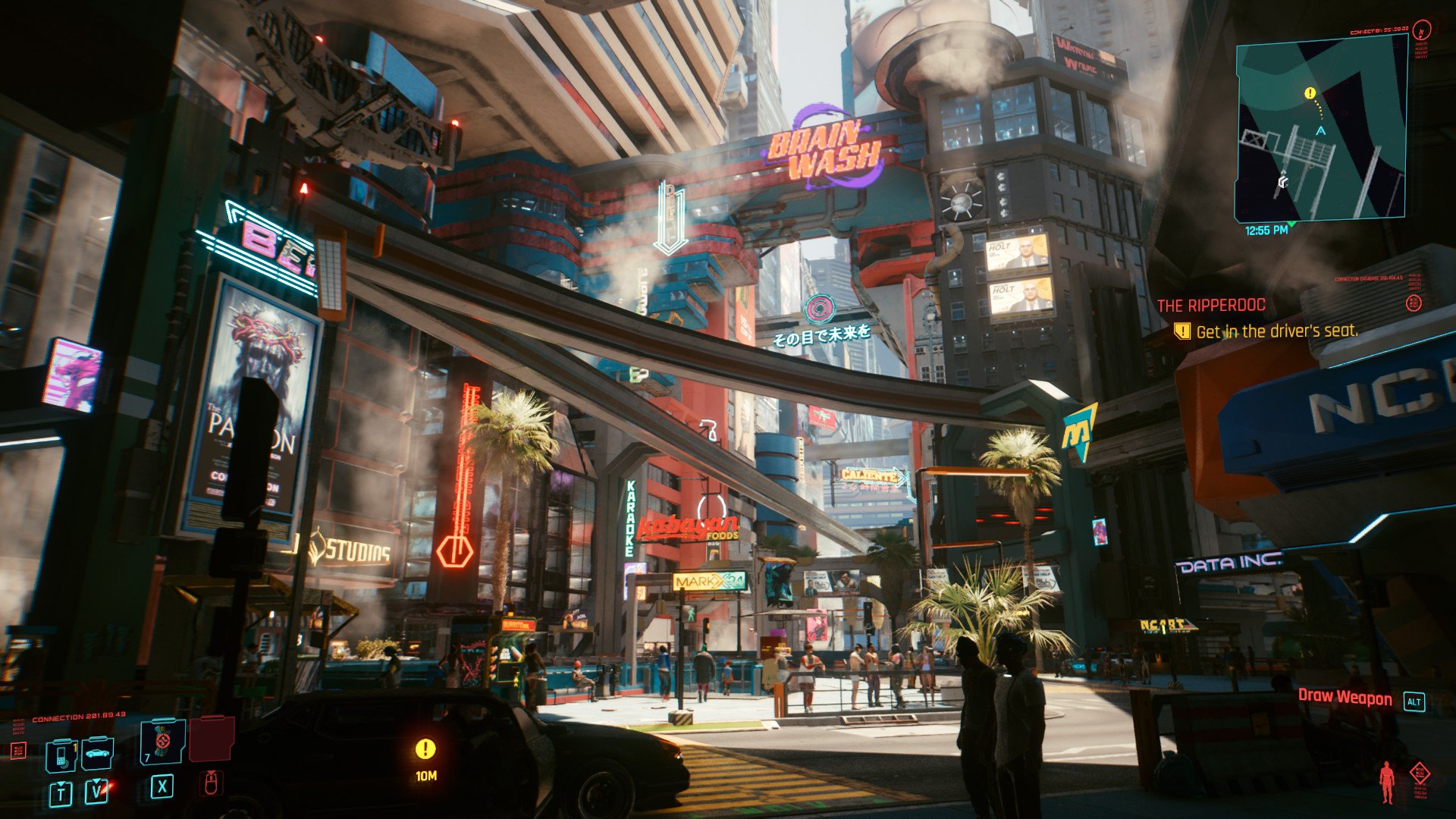
Different companies vie for control of the world, with the Arasaka megacorp taking center stage as Earth's biggest and most powerful organization. Arasaka has its own private military, with orbital stations blanketing the globe in technological tyranny. Other corps like Biotechnica and Militech compete, often violently, with Arasaka, with collateral loss of human life tallied up as a business expense rather than a tragedy.
Unrestrained capitalism and the proliferation of cybernetics has degraded the value of the human entity. Shame and privacy are a thing of the past, with sex used openly in all forms of advertising, while addiction to cosmetic and physically-enhancing cybernetics run rife.
You play as V, selecting from one of three backstories. Nomad tribes rule the roads between the megacities, handling smuggling and "logistics" for different groups looking to transport goods on land. You can also play as a Corpo, as someone who worked within one of Arasaka's cut-throat divisions. Finally, you can be a street kid who grew up among gang warfare in one of the city's slums. Whichever back story you choose can bring consequences and opportunities in equal measure as you wind your way through the game's enthralling plot.
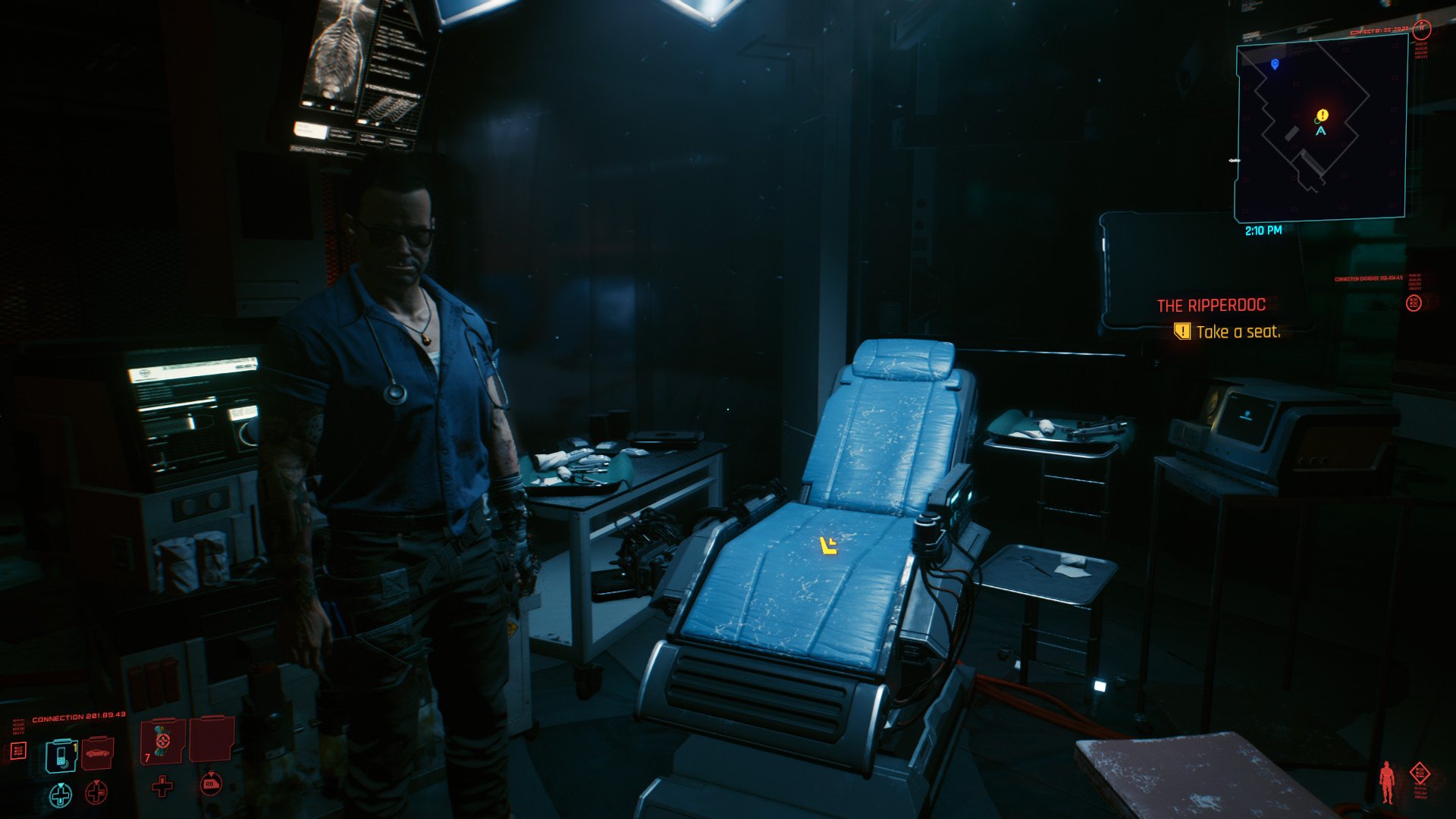
Without giving away too much about the plot itself, Cyberpunk 2077 raises the bar so high for digital storytelling in various, critical ways. CD Projekt RED uses several techniques to maintain a sense of immersion, with an attention to detail that is simply rarely attempted by other studios. Cyberpunk 2077 makes very sparse use of repeated, canned animations, with almost every conversation fully choreographed out, complete with unique props as necessary. This extends to big setpiece story missions and even smaller side missions, making it so easy to forget you're playing a game. The vast majority of the game's cutscenes never take control away from the player. If it needs you to sit put for a moment, it'll likely give you a chair to sit on or a railing to lean on.
Early on, Cyberpunk 2077 introduces you to the game universe's "Braindance" phenomenon. Similar to the movie Total Recall, Braindancing lets you experience the sensations of another individual who has stored their memories or an experience using implants. In some weird way, experiencing these first-person Braindances grounds you into the game's universe. Many people decried Cyberpunk 2077's insistence on a first-person perspective, but it is critical to its storytelling. Without giving away too much, the HUD overlay itself is part of the game's narrative — you're literally seeing the HUD inside V's implants.
It's hard to put into words just how many seemingly innocuous details here can have a big impact on the narrative experience. It speaks to the fact, so many of us overlook the importance of body language.
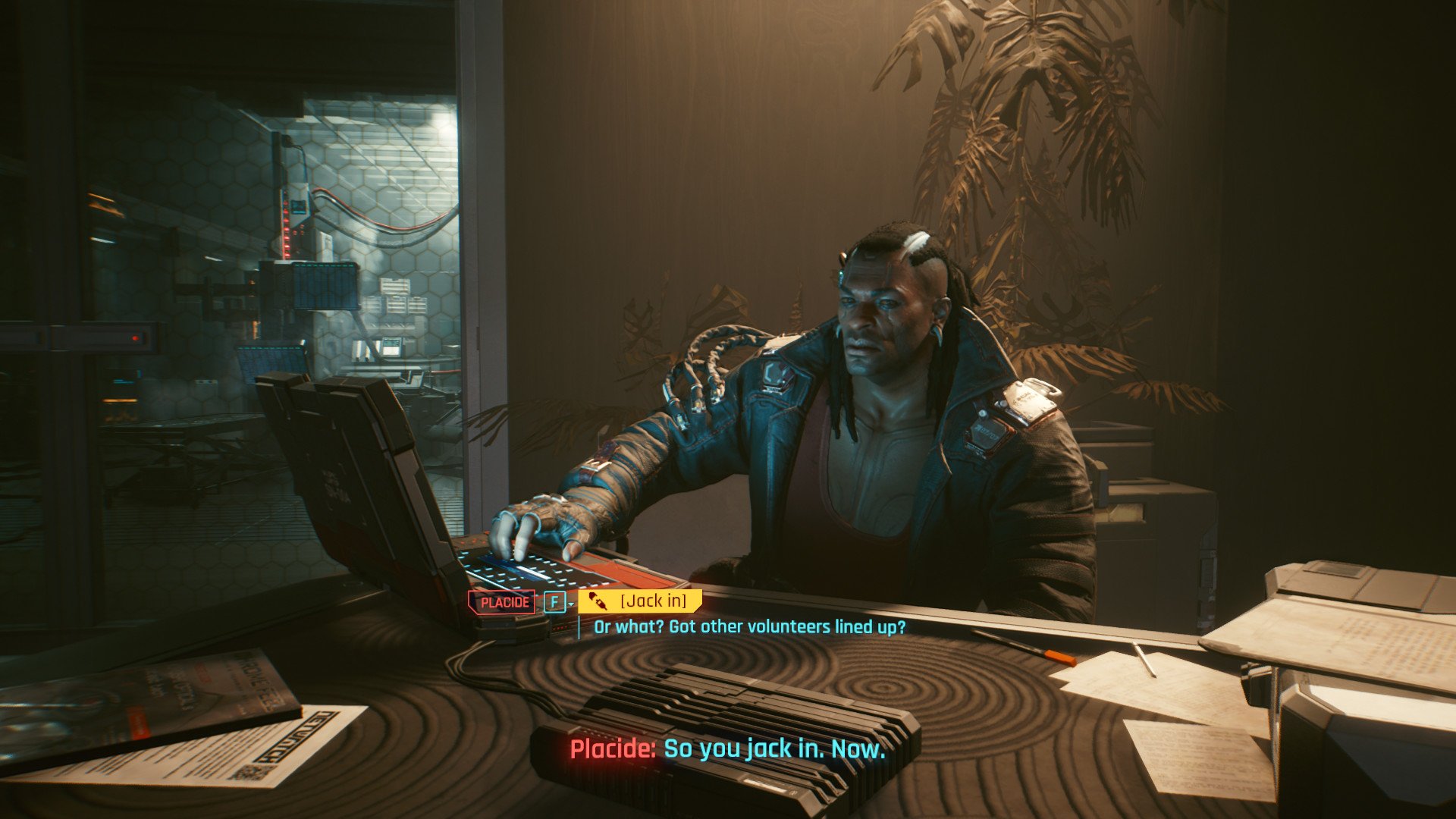
In one conversation, I noticed Jackie, V's best friend and partner in crime, had a nervous leg twitch during an important conversation with a potential business partner. I noticed that another character had taken up smoking more frequently in cutscenes after I had offered them a cigarette previously, despite having previously quit the habit. The subtleties in a faraway stare, a frown in response to a particular comment, wringing hands, grinding teeth.
All of these small human behaviors are so often consciously lost, and the fact this sort of effort rarely shows up in other games is a testament to the thoughtfulness of CD Projekt RED's design here. I found myself hanging on every character's word. The authenticity in Cyberpunk 2077 is somewhat unprecedented. I found myself tensed up before a dangerous mission, wondering if characters I'd become invested in would survive or not. Life in Night City is not only dangerous but also cheap, and the characters share a common quest to find even a mote of humanity in a world that has become so pervasively material.
Night City is a twisted vision of our culture pushed to its most extreme conclusion. The central theme of the game is transhumanism and what exactly it means to be human. Where does the "Soul" fit into a world where you can replace virtually every part of your body with machinery? How much of the human experience can be digitized and reduced before it stops being human?
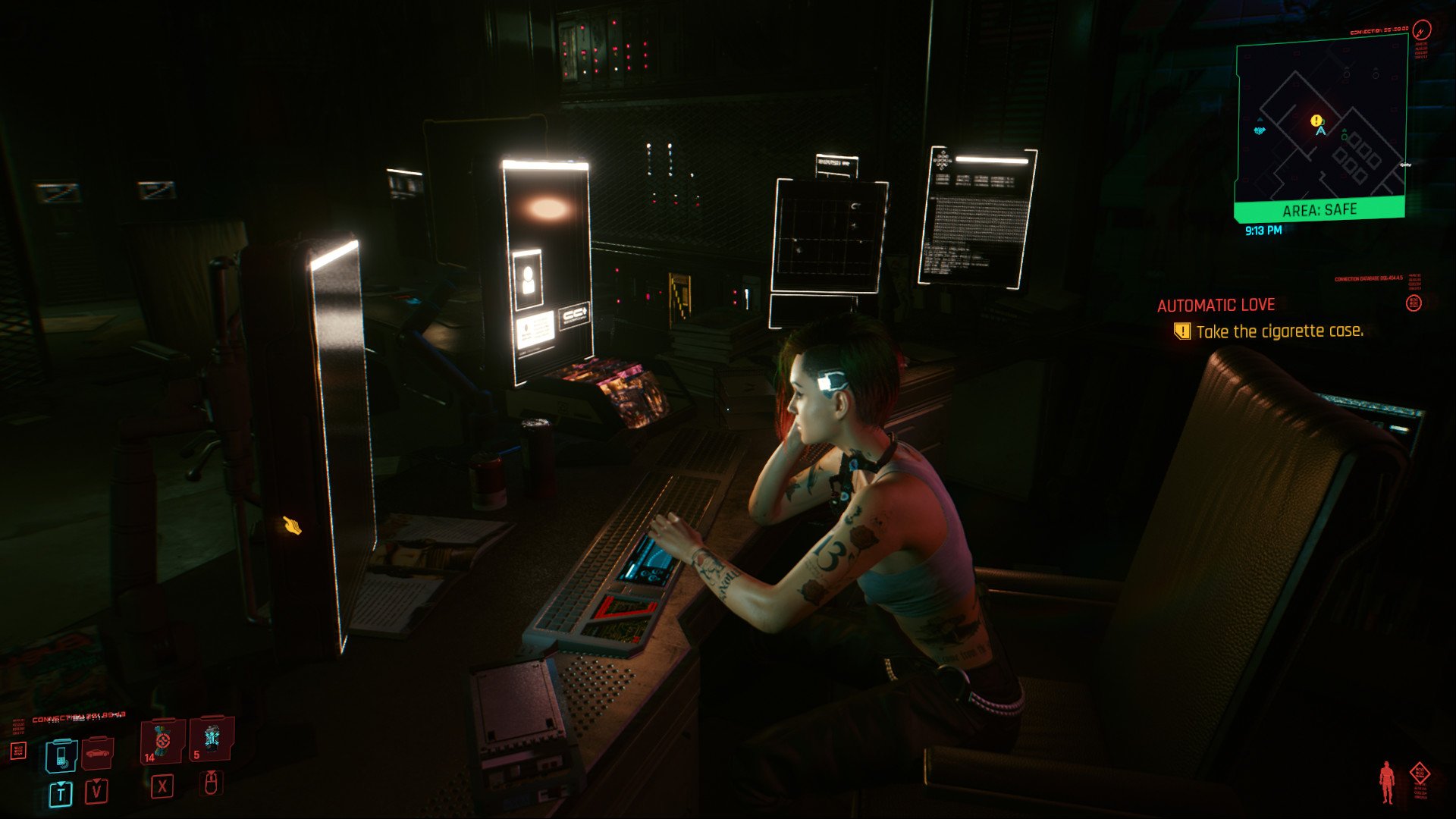
Cyberpunk 2077 will solidify CD Projekt RED's legend as one of gaming's greatest-ever storytellers.
Cyberpunk asks what the world would look like where the human physical entity is no longer essential, or in some cases, even desired. Life itself is no longer sacred in this world, and that fact permeates every corner of Night City, from its billboards to the corpses that litter the alleyways, forgotten and abandoned to the elements.
It's in these questions that Cyberpunk 2077 transcends the vast majority of its competitors, with a plot that is unsanitized and uncompromised, with a confidence that is typically reserved for cinema. Thanks to this fearlessness, CD Projekt RED portrays humanity at its most brutal and most beautiful.
It's tough to review a game's story without injecting spoilers, but it really just begs to be experienced. I beg you to go in blind. The authenticity in the choreography and sheer volume of motion capture, the impassioned performances from the game's cast, the moments of raw despair and desperation. All of these coalesce into a beautiful whole and make Cyberpunk's story all the more engrossing and evocative. It's becoming increasingly rare that AAA games actually make me care about the characters they portray, but like Witcher 3 before it, CD Projekt RED shows once again why it is the best in the business.
The choices you make, the characters you help, and the factions you anger can have a dramatic impact on the ending you'll receive. My particular ending left me lost for words, and I'm sure yours will differ heavily from mine. One thing is for certain, though. Cyberpunk 2077 will solidify CD Projekt RED's legend as one of gaming's greatest-ever storytellers.
A liberating diversity of styles
Cyberpunk 2077 review: Gameplay
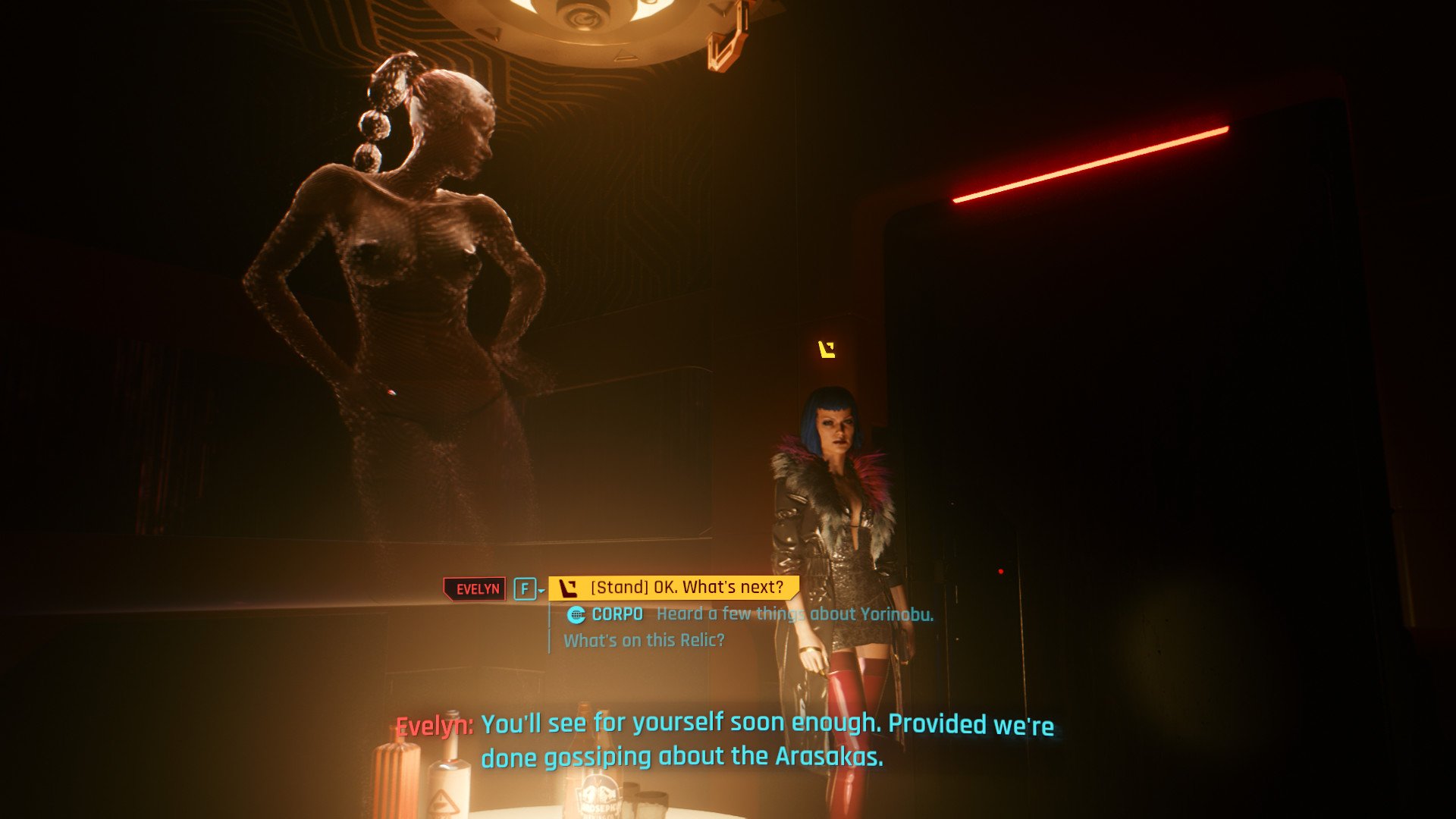
Gameplay-wise, Cyberpunk 2077 bears familiarity with some of the most iconic immersive sims like Deus Ex, with a buffet of character customization affording complete control over your experience.
Cyberpunk 2077's attributes breakdown into Intelligence, Tech, Cool, Reflexes, and Body. Each attribute also comes with a perk tree that gives you deeper access the more points you invest in it. Want to play as a stealth ninja wielding tech katanas? Invest in Reflexes for access to blade skills and Cool to deepen your sneaking capabilities. Want to play as a heavy gunner? You can put points in Body for additional strength, and maybe even pick up the Gorilla Arms limb cybernetic to rip doors off their hinges and take turrets out of their bases. Who needs lockpicking anyway?
For my playthrough, I wanted to create a Netrunner, which is loosely equivalent to a modern-day computer hacker. Netrunners use all sorts of implants and augmented reality interfaces to poke holes in the Net, which is in a sorry state in 2077's New United States. After several major wars, the internet as we know it has become fragmented.
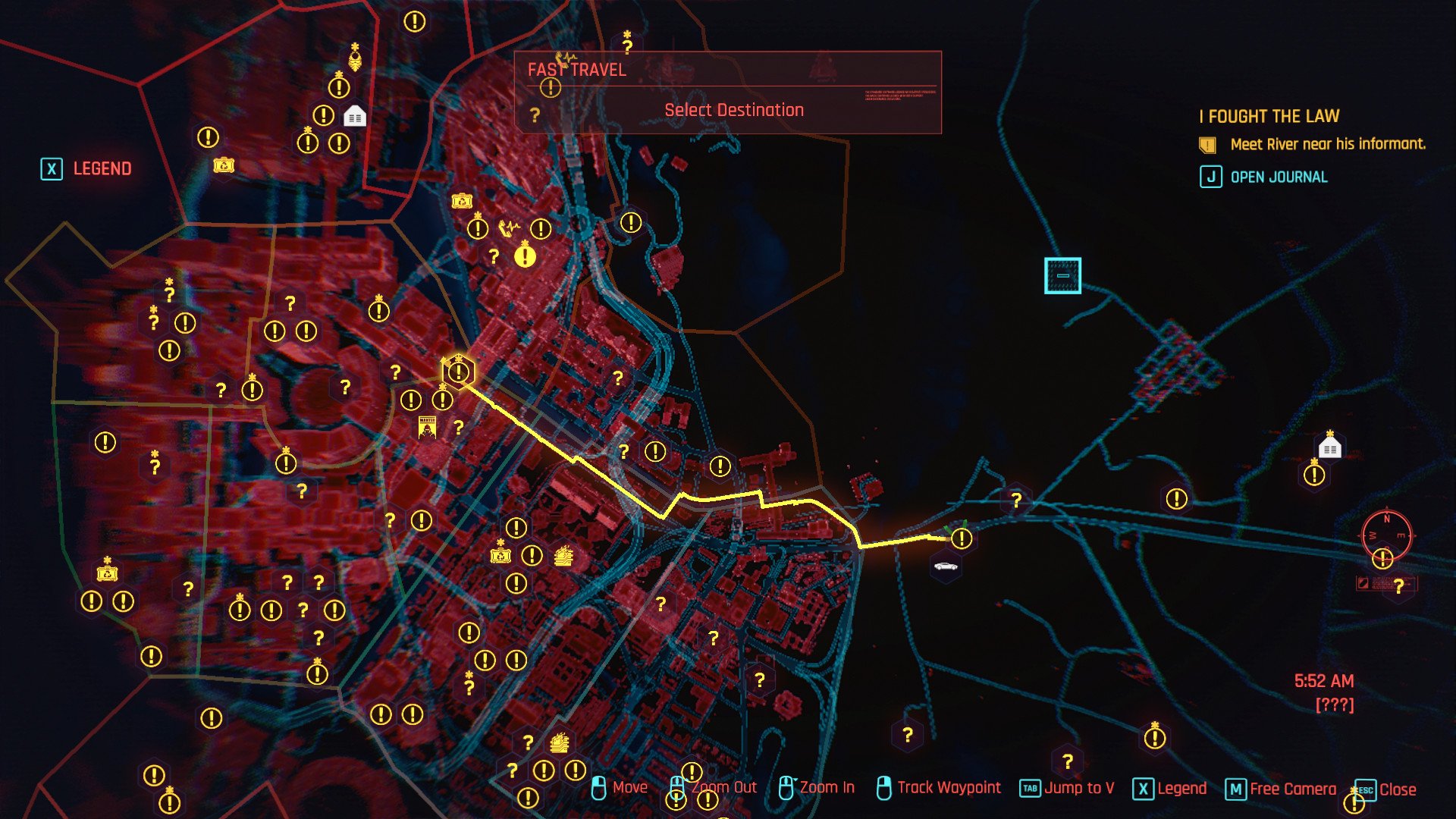
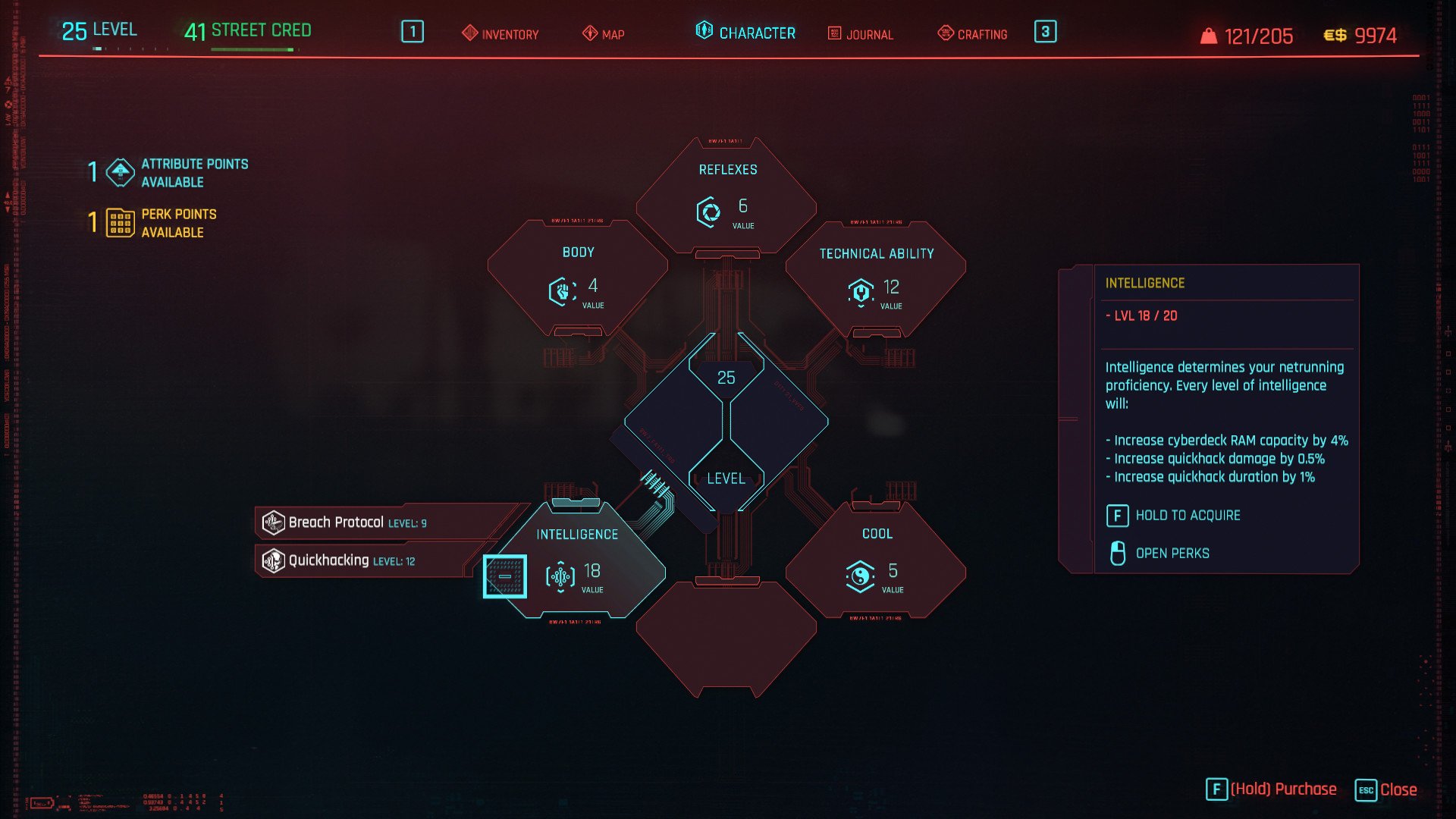
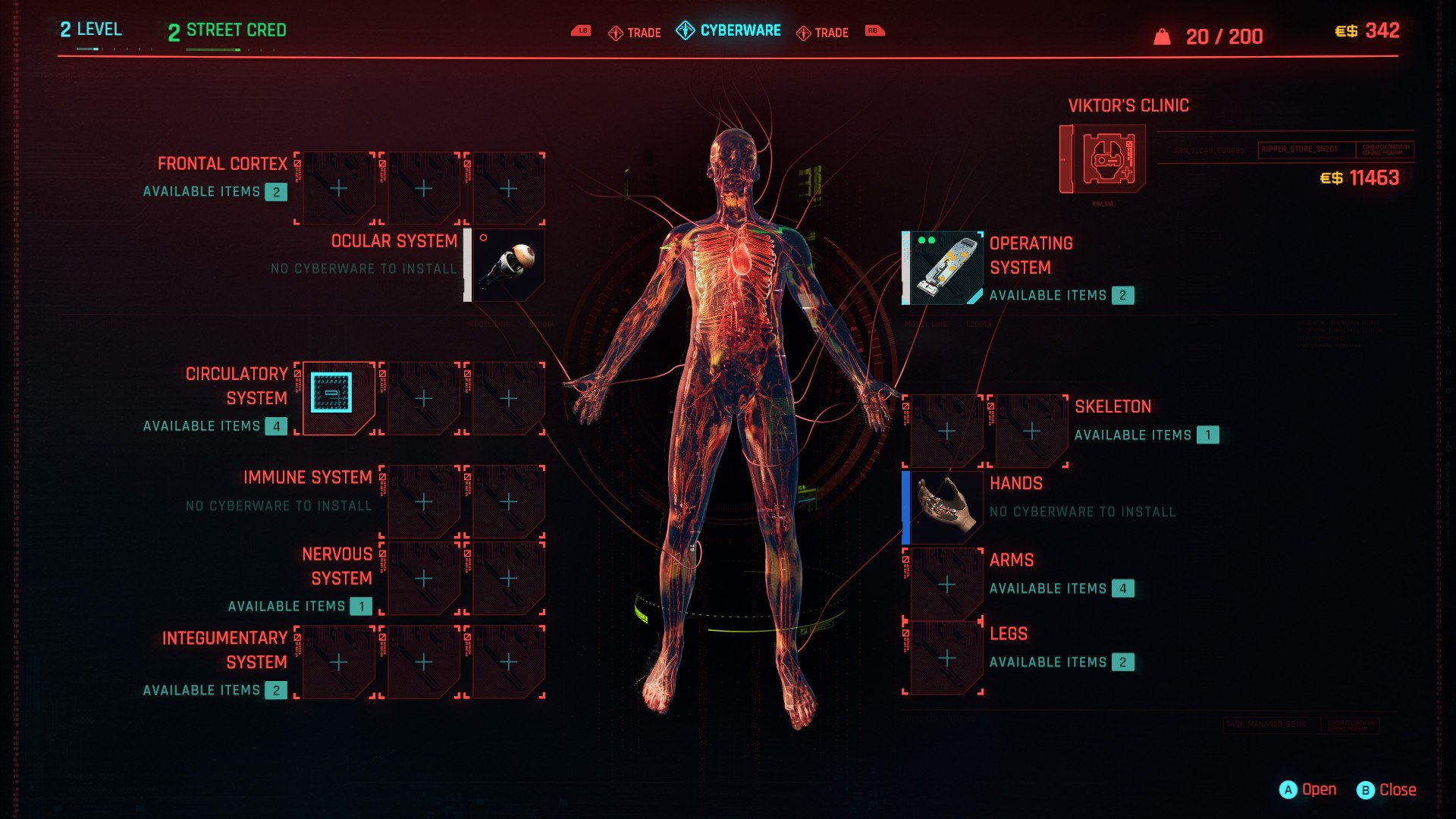
Source: Windows CentralCyberpunk 2077 has so much to see, so much to do, and so many different ways to play.
Society has fallen back into closed networks and a heavily sanitized version of the world wide web, policed by virtual law enforcement corps like NetGuard. Players can learn a range of Quick Hacks that can destabilize and debilitate enemy groups, which are often (but not always) connected together into a single subnet, which typically covers specific locations and squads of enemies. To start with, some of the Quick Hacks let you overload an enemy's ear implants, creating sonic interference. Another lets you overload their CPU, causing them to overheat and eventually ignite on fire. Later on, you'll get the ability to control their very thoughts, influencing them to simply shoot themselves in the head, or walk over to an enemy group and detonate a grenade.
Every playstyle is catered for nicely in Cyberpunk 2077.
If you chose that style of play, you end up rather squishy as a result. Enemy Netrunners may also start to become aware of your presence the more you dig into a group's subnet, and start to counter your hacks, forcing you to take a more proactive approach to combat. To that end, Cyberpunk 2077 has an impressive range of weapons of all shapes and sizes, and for all types of scenarios.
Tech weapons line up nicely with the Netrunner playstyle. These weapons shoot some type of radio wave that can penetrate walls and armor, blowing literal holes in enemy hides. They can be rather noisy, though. A stealth approach might include a silenced pistol or sniper rifle, for facing threats from afar or from a shadowy corner. There are mountains of melee weapons too, from throwing knives to katanas, to light machine guns and even old school sawn-off shotguns. Every playstyle is catered for nicely in Cyberpunk 2077, and it also enhances replayability.
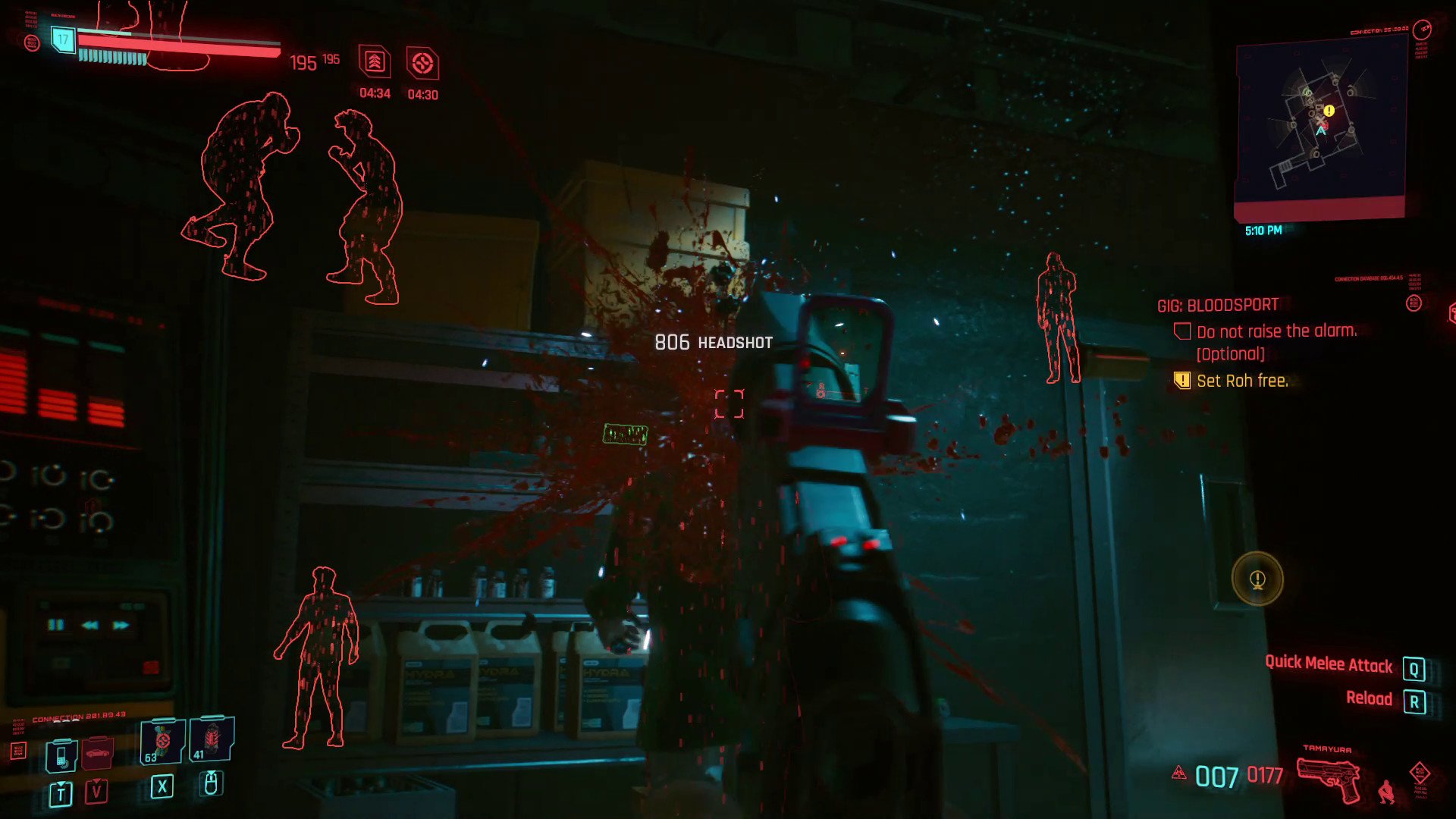
Speaking of replayability, Cyberpunk 2077's liberating diversity of gameplay styles is also complimented narratively too. Your backstory choice can be used to open up new pathways through quests, or even gain hints about infiltrating a location. Your Body attribute can be used to intimidate people into submission, or your Cool stat can be used to smooth talk someone into doing your bidding.
As you grow in power, so does your capability to carve your enemies into bloody chunks. Beyond stats and attributes, you can also enhance yourself further with cybernetics. Some might enhance your Netrunning capabilities, giving you more slots for programs to upload into enemy brains. Others might give you the ability to "slow down time" by enhancing your reflexes. Cybernetics that enhance your arms might give you the capability to slice and dice enemies from afar or smash them with boosted strength. All of these enhancements are expensive though, forcing you to do what V does best — mercenary work.
Undertaking mercenary jobs is by far the best way to earn cash (Eurodollars) in Cyberpunk 2077. These range from dynamically-generated LAPD contracts that simply ask you to resolve local reports, which might be an assault-in-progress or gang-related activity. Other jobs are called Gigs and are usually more complex tasks given by merc job brokers, known as Fixers. These can range from short delivery missions to quite grand side missions that take place in unique locations, with unique characters. Side missions are generally offered by other characters in the game's story, and come with more bombastic setpiece moments or special character interactions. Then, you have main missions that further the game's plot.
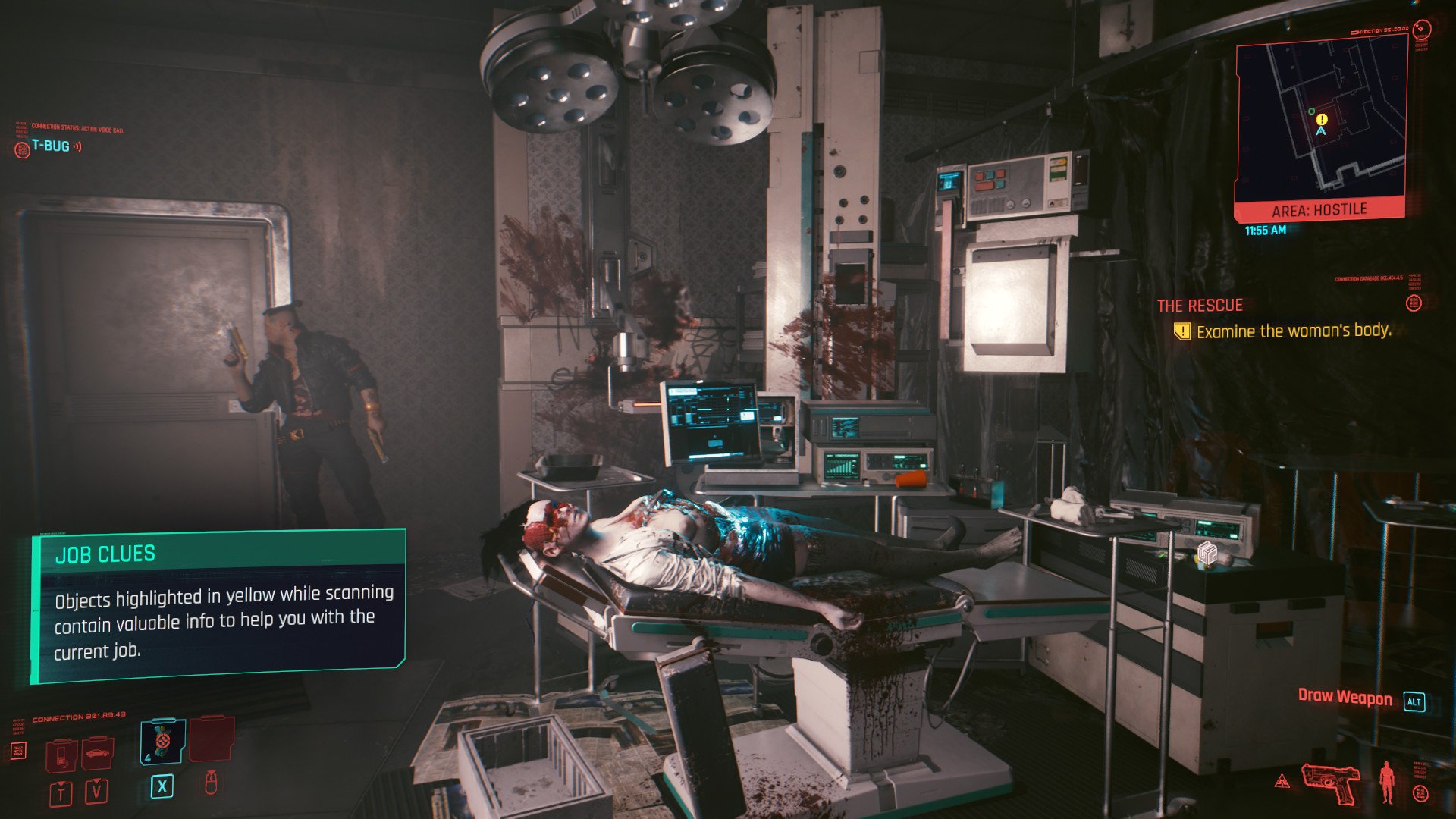
The main missions are the game's centerpiece experiences, giving you that little bit extra. Ever present is Johnny Silverhand, famously portrayed by Keanu Reeves, who remarks upon your actions, and in some cases tries to influence them. I'm nowhere near the end, despite having a week and dozens of hours inside Night City already, but it feels like it offers so much more than similar games I've played recently.
I feel like I'll be playing this game for months, maybe years to come.
I've battled scavengers from the back of a speeding van in the middle of a massive nuclear sandstorm. I've scaled skyscrapers to assassinate snipers in the middle of a holographic parade. I've disguised myself as a corporate stooge and heisted advanced tech from the most powerful corporation in the world. I've carved a bloody path across Nighty City and out into the desert, and I still have the freedom to start over and play the game without killing a single person. I feel like I'll be playing this game for months, maybe years to come, in a similar fashion to your Mass Effects, Skyrims, or Dragon Ages of old, going back over and over to see how else I experience the game's diverging, branching pathways. And despite how positively I feel about Cyberpunk 2077, as you might expect in a game this complex, it's not without its rough edges.
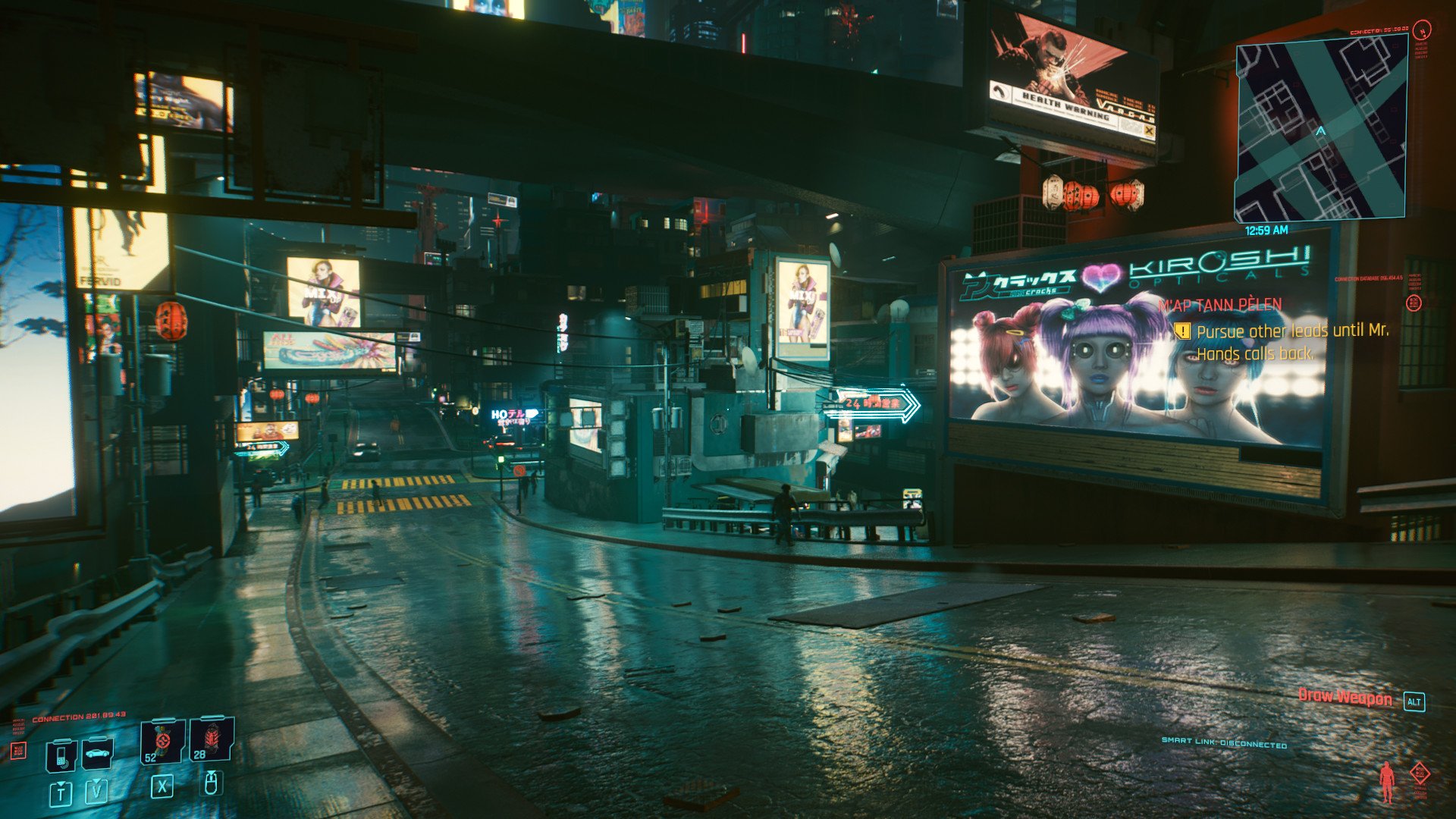
There is a range of small problems that hinder Cyberpunk 2077, but by no means break it. The REDengine is completely new, and it presents its immaturity through some of the game's stranger bugs. Sometimes when I summon my vehicle, I've had it drive up and clip through an object, then spontaneously flip into the sky after it realized it was somewhere it wasn't supposed to be. As a stealth character, sometimes I seem to alert an invisible enemy, or something stuck below the floor, causing the entire squad to enter the combat state. One of the most egregious bugs I had hurt one of the game's early emotional scenes, as a character's speech was comedically undermined by a gun that was floating through the air. In a game that's all about immersion, these types of issues can be all-the-more annoying. Another high-profile bug that remains unfixed is the Quick Save feature, which often fails to fully record your enemy's combat state as you move between save files.
Update: Since writing this review, CD Projekt RED has issued updates to Cyberpunk 2077 that fix many of the bugs outlined here, including the floating weapons and other engine anomalies.
There is a range of small problems that hinder Cyberpunk 2077, but by no means break it.
The game doesn't do a particularly great job at explaining some of its systems, either. For example, even after a week's worth of play, I'm still unsure of the exact mechanics of how enemy Netrunners are able to locate you. And even when they do, it doesn't seem like they actually do anything with that information, remaining in a dormant state. Some of the game's weapons seem a tad under-tuned as well. I chose the Nanowire as my main arm implant since I thought it would give me the ability to garrotte enemies, alas, the game only has two stealth takedown animations from what I've found, regardless of the weapon you're using. The Nanowire's previously-advertised remote hacking capabilities seem to have been removed too. Or if they're still in the game, it's not really explained how to use them. Cyberpunk 2077 even has its own irritating Roman Bellic from Grand Theft Auto, who will constantly call you and ask if you can find their missing taxis, instead of going bowling.
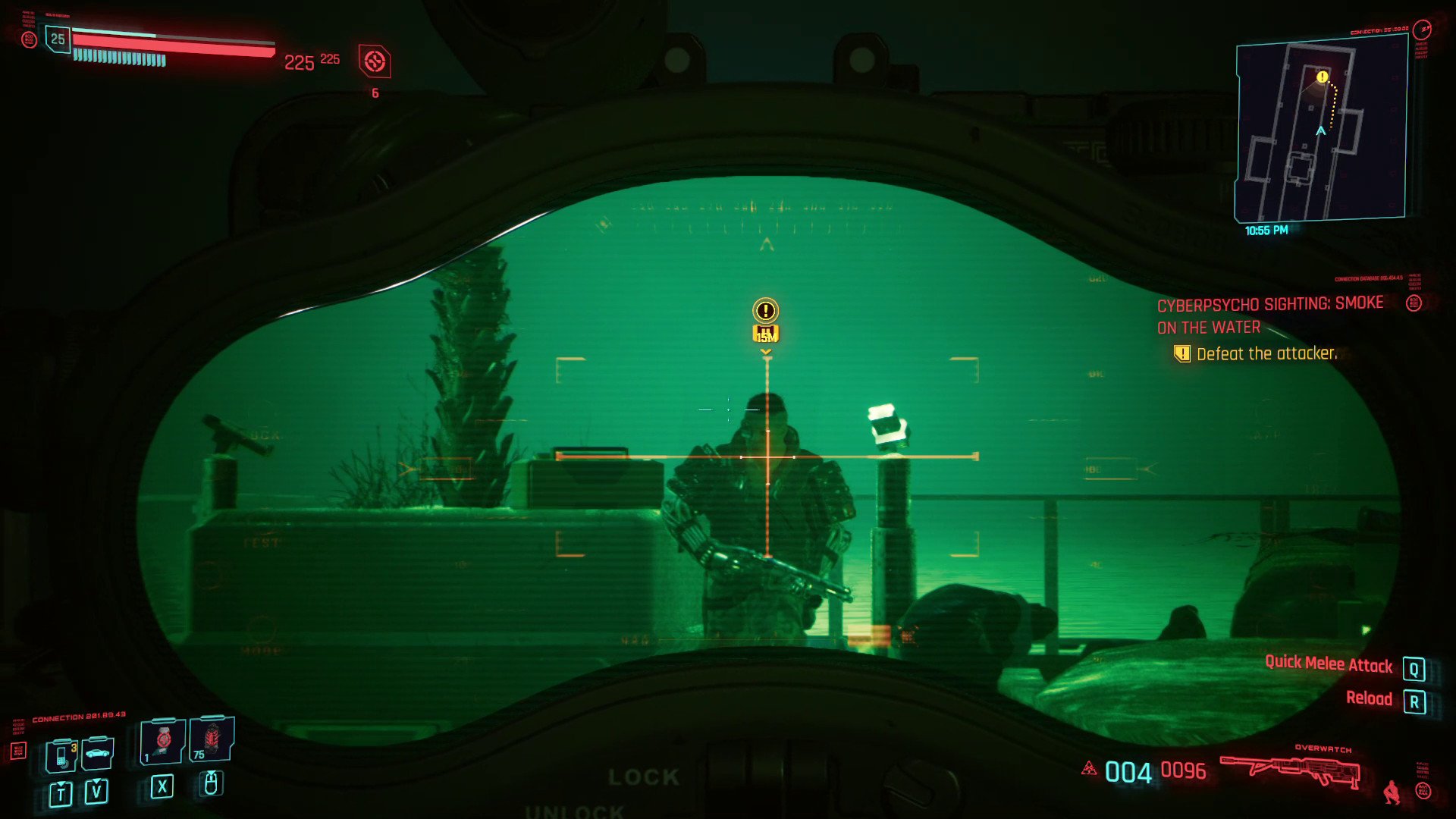
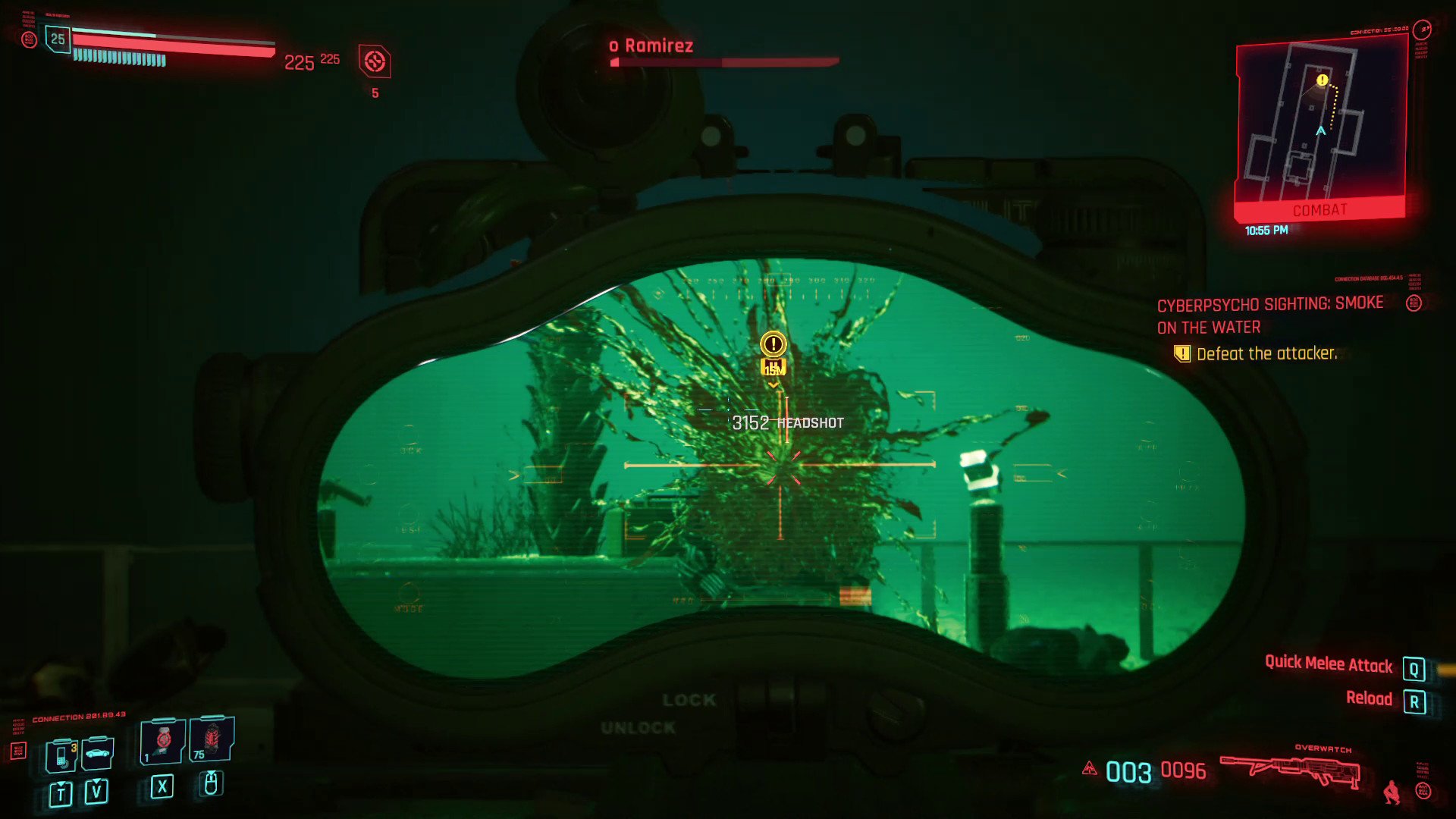
Source: Windows Central
It could be seen as a good thing that Cyberpunk 2077 doesn't hold the player's hand, but I can also see the other side of the argument. The lack of information could lead to confusion and frustration. It certainly seems possible to build a character that is full of skills that don't compliment each other well and buying the shards to re-vamp your attributes and perks is incredibly expensive.
CD Projekt RED has already dropped a couple of updates on the game during the first wave reviews program, with another update to drop on launch day as well. The updates have gone a long way to fixing many of the issues I had with some of the earlier builds, which bodes well for the future. CD Projekt RED has also proven itself to be diligent at polishing its games, adding in free content and gameplay tweaks based on community feedback to The Witcher 3, and there's no reason to think this won't also be the case with Cyberpunk 2077.
An experience without peer
Cyberpunk 2077 review: Conclusion
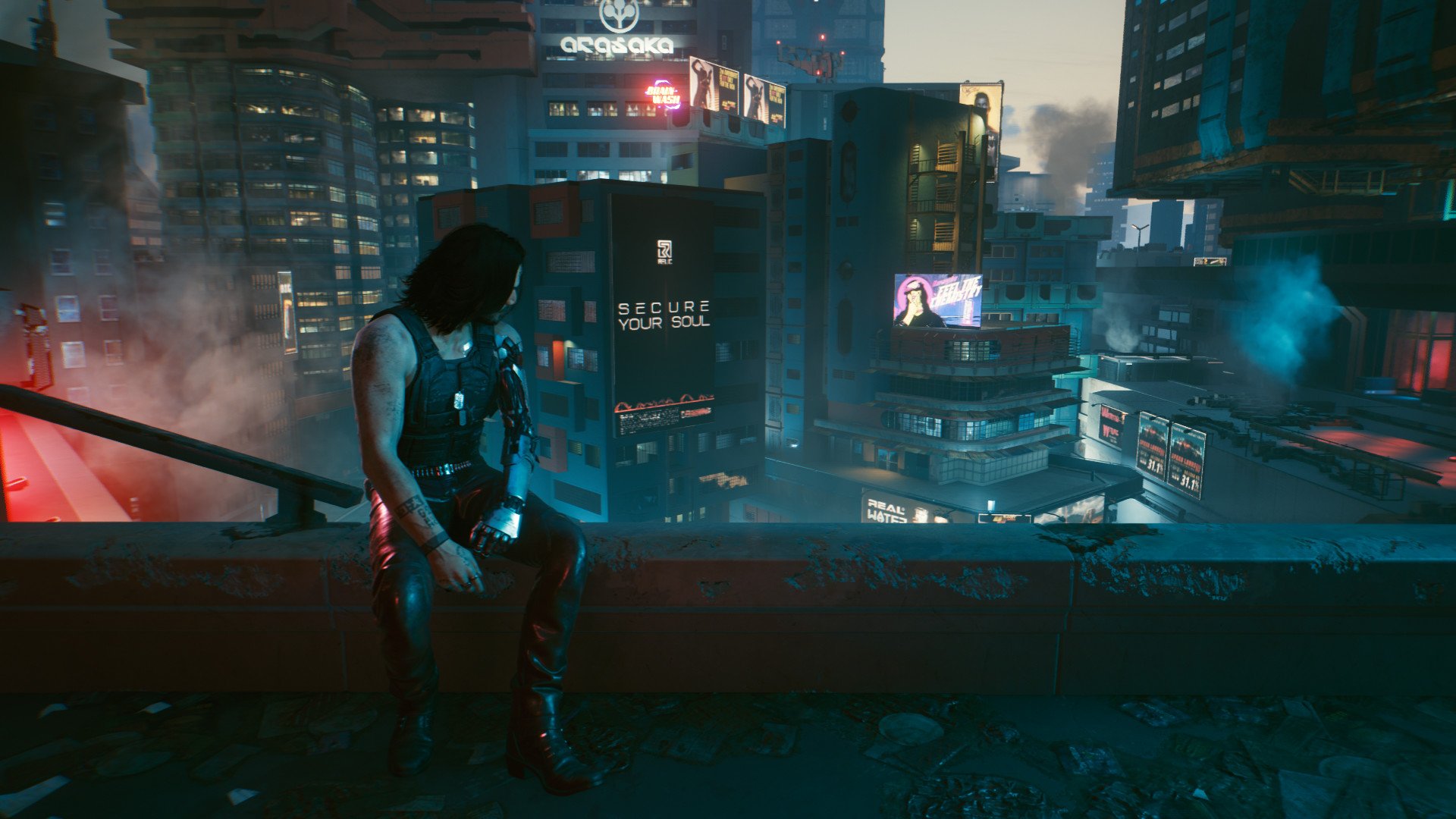
If for whatever reason Cyberpunk 2077 is the last game I ever review, I'll be more than satisfied. Cyberpunk 2077 is a landmark experience that will remain the standard-bearer for immersive play for years to come. Maybe only CD Projekt RED itself will be able to top it.
Cyberpunk 2077 is an experience without peer.
You can feel the love, the sheer force of will that every developer has poured into this project, which I reiterate, for me, is simply without equal. Regardless of what aspiring censors and opinion peddlers may say about it, I believe Cyberpunk 2077 will stride into the history books with confidence and conviction. Cyberpunk 2077 is a celebration of the entire medium, marrying cutting-edge technical innovation, unrestrained user agency in an authentic and immersive experience that transports you to another universe. No game has executed on the promise of gaming like Cyberpunk 2077. CD Projekt RED's artistic achievement cannot be overstated.
Despite an impressive array of bugs and glitches, Cyberpunk 2077 remains an experience without peer. No punches pulled, no platitudes are given, and no compromises are made. Cyberpunk 2077 is an industry highpoint that, simply put, may never be bested. Right now, and without hesitation, I am overjoyed to say Cyberpunk 2077 is everything I've ever wanted from a game. It is the best game I have ever played.

A landmark achievement.
Cyberpunk 2077 is one of the most liberating open worlds in recent memory, with meticulous attention to detail, unprecedented amounts of motion capped scenes and a story that will leave you shaken to your core. The wait for Cyberpunk 2077 was worth it because it is quite easily a candidate for the "best game ever made."

Jez Corden is the Executive Editor at Windows Central, focusing primarily on all things Xbox and gaming. Jez is known for breaking exclusive news and analysis as relates to the Microsoft ecosystem while being powered by tea. Follow on Twitter (X) and Threads, and listen to his XB2 Podcast, all about, you guessed it, Xbox!
